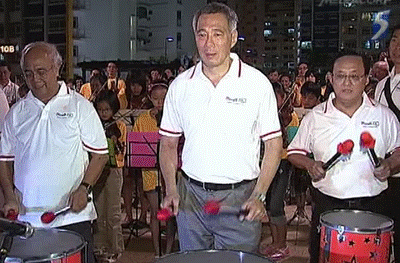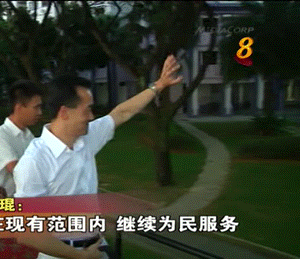Get paid so much still dunoo... nnb... still say "NEXT TIME".... why don't say "NOW"???
PM Lee admits govt lacked 20/20 foresight - Channel NewsAsia

SINGAPORE: Prime Minister Lee Hsien Loong has admitted the government did not have 20/20 foresight, resulting in problems with inadequate infrastructure in the country.
He was speaking at the "Singapore Perspectives" conference on governance organised by the Institute of Policy Studies on Monday.
Acknowledging the problems of insufficient housing and inefficient transportation network, Mr Lee pointed out that the government was blind-sided by the outcome of some international events.
He elaborated that in 2000 and 2001, the 9/11 terrorism attack on the United States plunged countries into recession. Singapore dealt with a slow economy with minimum population growth and local housing prices went down.
But by 2005 and 2006, Mr Lee said the mood changed and the economy started picking up.
So, he said, the government did what it thought would have been appropriate then. It decided to make up for lost time by growing the population and boosting the economy.
He acknowledged that infrastructure like housing and transport didn't keep up with that growth.
Mr Lee said: "I decided that we should try and make up for lost time because you want the economy to grow. You want Singapore to make progress and you don't know how long the sun is going to shine. As it turned out, the sun remained shining for longer than we expected. So the population grew faster than we expected, our infrastructure didn't keep up.
"Should we have given ourselves more buffer and said let's build and be ready? I think in retrospect, clearly we could have done more. Could we have predicted that we would have five years where the economy would grow brilliantly and our population would increase so rapidly? I don't think we could easily have said that.
"Should we then have said, 'I didn't plan for this infrastructure, let's tell the businesses to go away and let's forget about the growth, we don't need the IRs, we don't need these extra jobs, we just stay where we were'. I think that would be very risky. So we went ahead.
"The strains showed up. It's quite instructive how they showed up. They didn't show up gradually, progressively but quite suddenly. When the global financial crisis came at the end of the decade, 2007/2008, we expected to go for a very deep dive.
"In fact in one quarter, we had minus 10 percent growth. Nobody talked about house prices, there was no shortage. HDB - we watched the market every day, the resale market was dead but we did the right thing with our Jobs Credit and other measures. We avoided a bullet, the world economy recovered faster than expected.
"In the middle of 2009, the wind changed...those of you in business, you would remember that in the course of two weeks, during one or two private property launches, somehow the wind changed. It's like the spring breeze touched your face and the market was off. By August, we were thinking of measures to cool things down and we've been trying to cool things down ever since.
"So we lacked that 20/20 foresight. Next time, we will try to do better, certainly to have a bigger buffer and not to cut things so fine. But I think it's very difficult to know, 10 years from now, how many you will need.
"Even if you know how many persons there will be in Singapore, you can't say how many houses they will need. Will they buy it? Or will they say, 'oh, I'm not certain because the economy is not looking good or the politics are not certain, well, I'll hold off'? But when the market goes up, it goes up with a vengeance and we've paid the political price, we learn from it."
In the 90-minute question and answer session, Prime Minister Lee also tackled a number of issues which included whether the wide-ranging social nets in Singapore would encourage citizens to become more dependent and if Singapore needs more space for discussion.
Mr Lee is of the view that the government needs to do more but he wants the government to be helping from behind the scenes, as opposed to Singaporeans expecting the government to jump in all the time.
On why there is still a need to moderate social space involving social media, for example, Mr Lee said the online community in particular is not moderating itself.
Extreme views are put out and responses and disapprovals are also extreme. So this cannot be left to itself.
Mr Lee said: "We don't believe the community in the social space, especially online, moderates itself. It doesn't happen anywhere in the world.
"You have views going to extremes and when people respond to their views, they may respond in an extreme way, and when people decide to disapprove of something which was inappropriate, the disapproval can also happen in an extreme way.
"It's in the nature of the medium, the way the interactions work and that's the reason why we think it cannot be completely left by itself."
- CNA/ir
PM Lee admits govt lacked 20/20 foresight - Channel NewsAsia

SINGAPORE: Prime Minister Lee Hsien Loong has admitted the government did not have 20/20 foresight, resulting in problems with inadequate infrastructure in the country.
He was speaking at the "Singapore Perspectives" conference on governance organised by the Institute of Policy Studies on Monday.
Acknowledging the problems of insufficient housing and inefficient transportation network, Mr Lee pointed out that the government was blind-sided by the outcome of some international events.
He elaborated that in 2000 and 2001, the 9/11 terrorism attack on the United States plunged countries into recession. Singapore dealt with a slow economy with minimum population growth and local housing prices went down.
But by 2005 and 2006, Mr Lee said the mood changed and the economy started picking up.
So, he said, the government did what it thought would have been appropriate then. It decided to make up for lost time by growing the population and boosting the economy.
He acknowledged that infrastructure like housing and transport didn't keep up with that growth.
Mr Lee said: "I decided that we should try and make up for lost time because you want the economy to grow. You want Singapore to make progress and you don't know how long the sun is going to shine. As it turned out, the sun remained shining for longer than we expected. So the population grew faster than we expected, our infrastructure didn't keep up.
"Should we have given ourselves more buffer and said let's build and be ready? I think in retrospect, clearly we could have done more. Could we have predicted that we would have five years where the economy would grow brilliantly and our population would increase so rapidly? I don't think we could easily have said that.
"Should we then have said, 'I didn't plan for this infrastructure, let's tell the businesses to go away and let's forget about the growth, we don't need the IRs, we don't need these extra jobs, we just stay where we were'. I think that would be very risky. So we went ahead.
"The strains showed up. It's quite instructive how they showed up. They didn't show up gradually, progressively but quite suddenly. When the global financial crisis came at the end of the decade, 2007/2008, we expected to go for a very deep dive.
"In fact in one quarter, we had minus 10 percent growth. Nobody talked about house prices, there was no shortage. HDB - we watched the market every day, the resale market was dead but we did the right thing with our Jobs Credit and other measures. We avoided a bullet, the world economy recovered faster than expected.
"In the middle of 2009, the wind changed...those of you in business, you would remember that in the course of two weeks, during one or two private property launches, somehow the wind changed. It's like the spring breeze touched your face and the market was off. By August, we were thinking of measures to cool things down and we've been trying to cool things down ever since.
"So we lacked that 20/20 foresight. Next time, we will try to do better, certainly to have a bigger buffer and not to cut things so fine. But I think it's very difficult to know, 10 years from now, how many you will need.
"Even if you know how many persons there will be in Singapore, you can't say how many houses they will need. Will they buy it? Or will they say, 'oh, I'm not certain because the economy is not looking good or the politics are not certain, well, I'll hold off'? But when the market goes up, it goes up with a vengeance and we've paid the political price, we learn from it."
In the 90-minute question and answer session, Prime Minister Lee also tackled a number of issues which included whether the wide-ranging social nets in Singapore would encourage citizens to become more dependent and if Singapore needs more space for discussion.
Mr Lee is of the view that the government needs to do more but he wants the government to be helping from behind the scenes, as opposed to Singaporeans expecting the government to jump in all the time.
On why there is still a need to moderate social space involving social media, for example, Mr Lee said the online community in particular is not moderating itself.
Extreme views are put out and responses and disapprovals are also extreme. So this cannot be left to itself.
Mr Lee said: "We don't believe the community in the social space, especially online, moderates itself. It doesn't happen anywhere in the world.
"You have views going to extremes and when people respond to their views, they may respond in an extreme way, and when people decide to disapprove of something which was inappropriate, the disapproval can also happen in an extreme way.
"It's in the nature of the medium, the way the interactions work and that's the reason why we think it cannot be completely left by itself."
- CNA/ir








